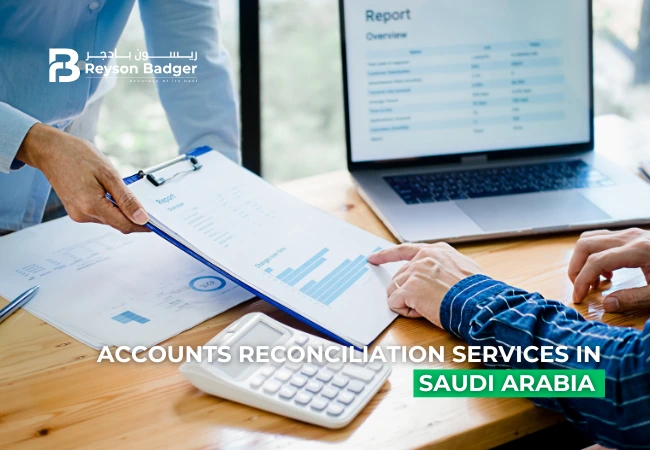
Account reconciliation simply compares an account against another account, for instance, by comparing bank statements and general ledger accounts. It actually looks at two record-keeping, sometimes to establish whether the two accounts in play are matched to be accurate and consistent. It is, therefore, an important aspect of managing finances, ensuring that financial transactions are correctly recorded and discrepancies are identified and addressed promptly. This role reconciliation has to play in Saudi Arabia primarily through the accuracy of maintenance of books of accounts, adherence to local regulatory measures, and ensuring transparency in all business-related activities.
As the economic times in the Kingdom keep changing with changed and more aggressive regulatory frameworks, a business should never assume that everything will fall in place without proper management of books of accounts because these books are prone to several mistakes and failings as far as the standards of Saudi financial regulations are concerned. Saudi Arabia's regulatory environment for finance, although an overarching part of ZATCA and SAMA, is always very demanding and strict on compliance with sound accounting standards. Hence, businesses in the Kingdom should align with such requirements to gain credibility over financial issues and not incur penalties, and effective accounts reconciliation is hence a necessity for the success of enterprises in the region.

Accounts reconciliation is an important business practice that offers numerous benefits to enhance the strength of financial management and overall operational efficiency. Accuracy and reliability of financial records form one of the best advantages of accounts reconciliation. Because internally prepared accounts are compared with externally prepared statements, a business will be able to verify its financial data to ensure that it is correct and thereby minimize errors that lead to incorrect reporting.
Identifies and Compensates for Differences
Accounting reconciliation allows the identification of differences between financial records, whether it is with bank statements or internal ledgers. The organizations, upon recognizing such differences, can immediately address data entry errors, unauthorized transactions, and timing differences. This enhances financial reporting accuracy.
Improves Internal Control and Governance
Regular accounts reconciliation promotes accountability and transparency in financial activities through developing internal control. It gives a base for tracking transactions and ensures that all financial activities are documented, and all financial work done is approved. This better form of governance reduces the chance of fraud and mismanagement.
Aids Compliances with Regulatory Requirements
Most of the regulatory requirements require organizations to keep accurate financial records and ensure consistent reconciliation. The successful implementation of such regulations enables businesses to avoid penalties and other lawsuits while demonstrating commitment toward compliance. This is important in places like Abu Dhabi, with stringent regulatory analysis.
Aids Proper Financial Decision
The third contribution is to sound financial decision-making with accounts reconciliation. With accurate financial information, the management of the organization is informed in budgeting, investment, or allocation of resources that will be based on true and factual figures. This clarity allows an organization to respond quickly to changing market conditions and fine-tune its financial growth plans.
Bank Reconciliation
Reconciling company's accounts with bank statements for consistency.
Matching general ledger and subsidiary ledgers for accuracy.
Balancing the transactions between the affiliated or subsidiary companies of a group.
Comparing the company's records with the customer and vendor account statements to strike out any differences.
Ensuring that the outstanding payables and receivables coincide with the recorded balance in the financial statements.
The reconciliation process in Saudi Arabia is systematic and involves several procedures to ensure the proper accuracy and reliability of financial records.
Pre-Fieldwork or Planning and Preparation
The planning and preparation procedure begins with determining the accounts that need to be reconciled. These would be the bank accounts, accounts receivable, and accounts payable. Subsequently, the organization collects relevant documents or records, which include bank statements, invoices, and receipts, among others, to perform a detailed comparison.
Fieldwork and Data Collection
Under these, there is fieldwork and data collection. This is where the auditors or finance teams compare the balances found in the company's records with the statements from outside sources. This is done by comparing every transaction that has been recorded in the internal ledgers with similar entries in bank statements or other sources of finance.
Audit Testing and Evaluation
Then during the testing and evaluation phase of the audit, a mismatch is discovered and addressed. The common problems are missing transactions, missing or unrecorded data, and errors in timing. Further research by the team is made on these mismatches including sending written inquiries to the parties involved, such as sending a question to the bank or to the vendor, regarding the difference in order to validate such disputes.
Reporting and Recommendations
Finally, the reporting and recommendations phase will record the reconciliation findings. Discrepancies in the process are established. Then, necessary adjustments are made to the financial book. A detailed report then will be derived from summarizing the reconciliation result and giving recommendations for internal control and procedure improvements.
There are a number of regulations and requirements in Saudi Arabia that govern accounts reconciliation to ensure the financial correctness and conformity of the state. This is supplemented by regulations set forth by the Saudi Arabian Monetary Agency which helps guide financial institutions and businesses to maintain records based on accuracy, mainly in terms of bank reconciliations.
Second, there are certain requirements from the Ministry of Commerce and Investment regarding the accounting practices that ought to be exhibited in the reconciliation accounts and accounting practice on regular updates to ascertain total transparency and reliability upon the reporting of financial statements. Regulations on zakat and tax compliance by ZATCA are other examples of appropriate recording of finances to ensure effective tax assessment and eventual payment.
Many entities are now aligned to follow International Financial Reporting Standards that force the accounting practices of the country with strict reconciliation processes to align with international standards. Taken collectively, these impose commitment to capital, improvement in governance, and support for compliance in Saudi Arabia and worldwide.
Reconciliation of accounts is a process that aids the company in having an error-free financial record, complying with all regulatory requirements, and safeguarding a company's financial health especially in Saudi Arabia to satisfy regulations stemming from entities like SAMA, the Ministry of Commerce and Investment, and ZATCA strictly adhered to.
Financial consulting firms like Reyson Badger, with its experience, deliver comprehensive accounts reconciliation services that concentrate on the unique regulatory environment of Saudi Arabia. It can help business organizations streamline the reconciliation process while reducing risks and ensuring compliance with International Financial Reporting Standards, or IFRS.
Ensure your financial records are always accurate and compliant with local and international standards. Let Reyson Badger handle the reconciliation of your accounts with precision and expertise. Contact us today for the best reconciliation services that keep your business running smoothly and stress-free.